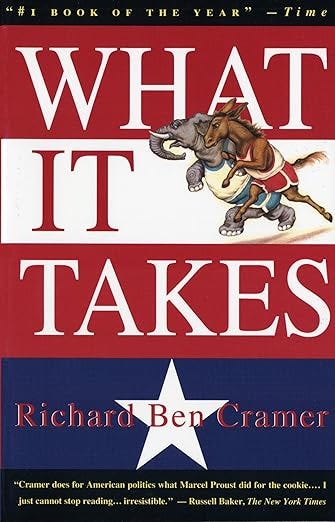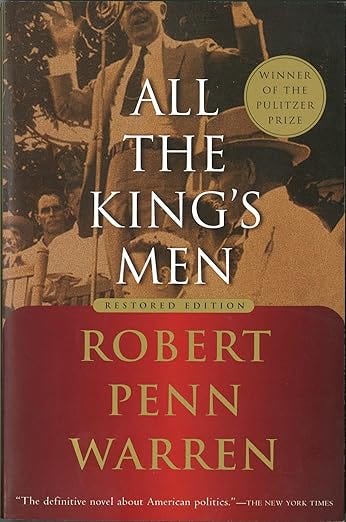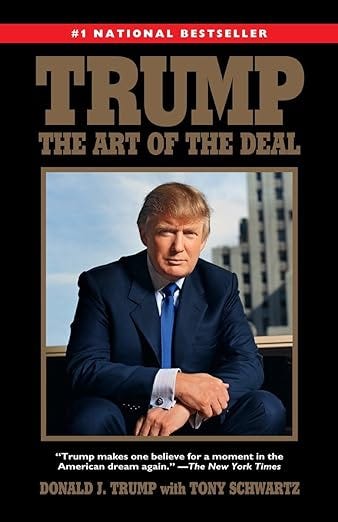"I always tell people they should read 'The Art of the Deal.'"
Independent journalist Chris Cillizza (formerly of CNN and The Washington Post) spoke with me about book recommendations to understand our current political moment and his favorite political reads.
Chris Cillizza is a veteran political journalist whose long career includes time at The Washington Post and CNN, and as a frequent panelist on “Meet the Press.”
His Substack, “So What,” has become one of my favorite reads lately as I try to make sense of the deluge of news each day. His weekly talks with former “Meet the Press” anchor Chuck Todd are always insightful. An early clip that piqued my interest was when Todd blasted Joe Biden’s “selfishness” for running for president while his family was falling apart.
When I saw Cillizza own up to stories he got wrong, I truly began to respect his take and decided to become a paid subscriber. In December, he posted “An apology about my Joe Biden coverage” on YouTube that began: “As a reporter, I should have pushed harder, earlier for more information about Joe Biden’s mental and physical well-being and any signs of decline.”
In January, he said he “screwed up” when it came to the origins of COVID-19, even sharing examples of stories that were off the mark. That kind of refreshing humility demonstrates a real concern for the truth.
As a paid subscriber, I got a 1x1 Zoom call,1 which I took advantage of to ask Cillizza about his favorite political reads, books he recommends to understand our current political moment and how to maintain a healthy media diet.
The following has been lightly edited for clarity.
What is your favorite political book of all time?
That's easy. I have two answers. I have the nonfiction category and fiction category. So nonfiction, I even keep them on my desk. This is always here. [He did indeed have this book right on his desk.] “What It Takes” by Richard Ben Cramer. This is incredibly long, over a thousand pages, and the print is very small. It's about the 1988 presidential campaign: George H. W. Bush, Bob Dole, Michael Dukakis, Gary Hart, Joe Biden. I love it. I mean, I knew Richard. He's passed away. I knew him later, long after he wrote this.
I think it's the best book about how campaigns work and who runs, who are the kind of people who run for this office and what were they like before they ran? Cramer did amazing work.
The funny thing about this book, it's about the ‘88 campaign. I think the book came out in 1991 or 1992. You could never do it now. Probably because there'd be so much that people knew already. So that's nonfiction. I love that book. When I teach journalism, political journalism, I always use that book. Parts of that book is kind of a reference.
Fiction: “All the King's Men” by Robert Penn Warren. Not only because there's an angsty emo reporter as the main character. He becomes a kind of press guy to the governor of Louisiana. I love that book. I go back and re-read it every couple of years.
I think most people know Robert Penn Warren, at least in the United States, as the poet laureate of the U. S., but I love his fiction in that book, which is loosely based on Huey Long, a real person. Those are the two that I come back to again and again.
I've heard of “What It Takes.” I've had that recommendation before. I should go ahead and read it.
It's so long. I always told people to read it during Biden's presidency because a very much younger Joe Biden ran for president in 1988 and Richard Ben Cramer got close to Biden. There's so much interesting insight about Biden, kind of how he had processed grief, who he was, what he wanted to be and why he was running. That informed the much-later-in-life Biden.
You can read the two things I always recommend people read. Read the stuff about Biden in there and read the stuff about Bob Dole's injuries in World War II and how he fought his way back to running for the Senate, and then running for President. It is that stuff alone, and that's probably 150 total pages. That stuff is incredible.
What are one or two books you would recommend that might help us understand the current political moment we’re in?
Sure. I have two, neither of which are recent and neither of which were written since Donald Trump was president: “Bowling Alone,” nonfiction [by Dr. Robert Putnam] and “Super Sad True Love Story” by Gary Shteyngart [fiction].
I think both speak to the disintermediation of social contact that technology has created. “Bowling Alone,” it predates that, but I think that's critically important to understand.
I always tell people that they should read “The Art of the Deal.” Because whether you like Donald Trump or hate Donald Trump—I feel like I've never met anyone who feels anything but one of those two things for him—the book is a remarkably insightful window into how he thinks. I don't think how he thinks has changed a whole heck of a lot between 1987 and now in terms of his approach to media, people who work for him and getting attention.
In the scene I always cite in the beginning of the book, he talks about a typical day in his life. He basically said like, “I don't really plan a lot of meetings. I kind of let the day come to me and then I react.” I think about that all the time as it relates to his presidency. Like these people who think Donald Trump is operating off of some grand blueprint every day. He is not.
He kind of explains how he thinks about things in the late 1980s. I think it's very similar to how he thinks about things now. So I always recommend that. I think people roll their eyes who don't like Donald Trump and don't want to support him or whatever. It's fine. But I said, like, he's going to be president one way or another for the next four years. So I think it behooves you to at least understand where this is coming from.
You wrote a recent Substack post about how Substack can’t become part of the #Resistance. Why is it so important to broaden your media diet?
I think it is a generally good development that these sort of big legacy media, mainstream media companies, no longer function as the gatekeepers of information and judgment. There’s the flattening of the media landscape broadly, where those bigger giants are still prominent and have more audience, but a little voice can also get some attention. I think that is a good thing.
The problem though, is that the flowering of all these other media outlets—whether it's a single person, a small group—it allows you now to totally exist in a content world—whether it's scripted content or news content—where you never have anything you think challenged. It’s true on the right and on the left, and I just don't think that's right.
I've spent a long time covering politics. You know, I never really felt like one party was right 99% of the time. It's just like a person. A lot of the people who unsubscribe say, “I don't agree with everything you say.” And I always try to respond to them and say, “Look, you do not have to subscribe. Totally fine. That said, if your bar for subscribing to anyone or anything is that you must agree 100% of the time, you absolutely should not subscribe to me.”
Because that's not my North Star. That's not what I'm going for. I'm not writing things because I know people will agree with it. And I think we've gotten into that mode. Particularly the left has become this sort of, “If you don't say that Donald Trump is Hitler, you're enabling him.”2
It's like, golly, that feels like there's got to be some nuance between, “I think many of the things Donald Trump does are radical and at times dangerous,” and “Donald Trump is Hitler.” But we've lost a lot of that nuance. I think a lot of people define free speech, particularly on the left, as “speech I agree with,” which is not how it works.
You know what I mean? Like, I'm not advocating for hate speech, but the idea that you can just shout down anyone who doesn't agree with you, that's not how we're gonna figure out how to get out of our current moment. I always tell people, look, if you're a conservative, I'm not saying you need to turn MSNBC on and watch 20 hours of it, but watch 30 minutes of MSNBC a week. Same thing if you're a liberal. Watch 30 minutes of Fox News a week. Read people who you don't agree with but you think are smart. And the problem is I think a lot of people are like, “Well, no one I don't agree with is smart,” you know what I mean?
There are smart voices and people making reasonable arguments that don't share your worldview. Try to force yourself out of your cocoon, out of your silo. It's harder than it's ever been before because it's easier to just lay in the warm bath of you’re right.
I always say this because I know it to be true: content creator people like me, a lot of these people are financially incentivized to give people what they want because people pay for what they want.
We're in this vicious cycle where the financial incentive of people creating a lot of the content is to throw red meat. People pick up the red meat, they pay for the red meat, which incentivizes the content people to give you more red meat. You know what I mean?
Like, people point out, “Oh, The Contrarian has 550,000 subscribers.” Yeah, but The Contrarian is directly positioned against mainstream media and against Trump. That's a pretty powerful thing. And I think The Contrarian is not going to all of a sudden be like, “Write a piece that says Donald Trump did something that was pretty good.” Do you know what I mean?
I just say, “You don't have to subscribe to me. You don't have to subscribe to any one thing. But you should not just have everything that you consume in the same bucket ideologically and probably in the bucket that you agree with.” You have to force yourself out of that. The other path is easier. I just don't think that path gets us anywhere in the long run. I feel really passionately about it because it would be more financially lucrative for me to be either predictably pro-Trump or predictably anti-Trump every single day. It just would be. On YouTube, Substack, anywhere.
It's not me, and I think it's bad for the country. I want those places to exist. I also think it is important that we have people like me who are at least trying—and I know not everybody agrees with what my view of calling balls and strikes is—but like trying to say, “This is not good [just] because Democrats did it and this is not bad [just] because Donald Trump did it.” Again, you need to have a little bit of that in your media. I think. I hope.
Oh, for sure. As someone who grew up in conservative West Texas and now lives in progressive Austin, I have plenty of friends on both sides and I see this play out.
Yes, my gosh, yes. Texas contains multitudes.
All my in-laws live in Texas. My wife is from Texas. So, we have College Station, North Dallas, almost Plano, another in Dallas. We don't have Houston, but we have almost every other major city. The politics of that state are fascinating to me, but that's a whole other thing. I mean, Austin is its own world, basically.
Oh, believe me, it is for sure.
As we were wrapping up, I told him how much I appreciated his Substack and his willingness to admit when he was wrong.
I wish I was the smartest person in the world and always got shit right, but like, you know, this is not realistic.
I think this expectation that you're always gonna be right, I actually think that's one of the problems we have in journalism. It's like we presented ourselves as the Voice of God for so long when in fact we were trying to figure it out. If we had said, “Look, this is the best that we know right now,” as opposed to, “This is how it is,” I think we'd be in a better place.
Cillizza graciously asked me to send him a link to my Substack as he enjoys finding new books and I shared a bit about my latest post sharing highlights from “Live from New York.”
I focused specifically on political satire and how SNL changed from the Bush era to the Trump era to the Biden era where we got, you know, Dana Carvey, only after Biden was off the ballot.
After several iterations of people who were nothing like Joe Biden. Dana Carvey is really good.
Yeah, but it was like, he had to be off the ballot. It didn't matter anymore.
You're right, exactly. When it didn't matter anymore, they got it right.
Thanks so much to Chris for taking the time to chat! If you aren’t already a subscriber to his Substack, I can’t recommend it enough.
Why did SNL pull its punches on Biden?
One of Michaels’ rules was, no groveling to the audience either in the studio or at home. In those first five years especially, SNL writers were not pleased when a studio audience applauded some social sentiment or political opinion in a sketch or “Weekend Update” item. The writers wanted laughs, not consensus.
"All the memories, the emotions were all still there on some level. That was surprising to me."
When Rob Henderson offered his followers a chance to talk with him, I eagerly signed up. I thoroughly enjoyed his memoir, “Troubled: A Memoir of Foster Care, Family and Social Class” and his many appearances on some of my favorite podcasts, including
This perk is changing but paid subscribers at higher tiers will still get to chat with Cillizza on Zoom.
Nate Silver has also noticed this phenomenon: “Republicans are generally happy when you agree with them partway or half the time. Admittedly, the sorts of Republicans who encounter [Silver Bulletin, Nate’s Substack] are not a representative sample, probably being on the moderate side — though you can find plenty of Trump supporters in the Silver Bulletin comments section.
Democrats, however — and here, I’m not referring so much to Silver Bulletin subscribers but in the broader universe online — often get angry with you when you only halfway agree with them. And I really think this difference in personality profiles tells you a little something about why Trump won: Trump was happy to take on all comers, whereas with Democrats, disagreement on any hot-button topic (say, COVID school closures or Biden’s age) will have you cast out as a heretic. That’s not a good way to build a majority, and now Democrats no longer have one.”












